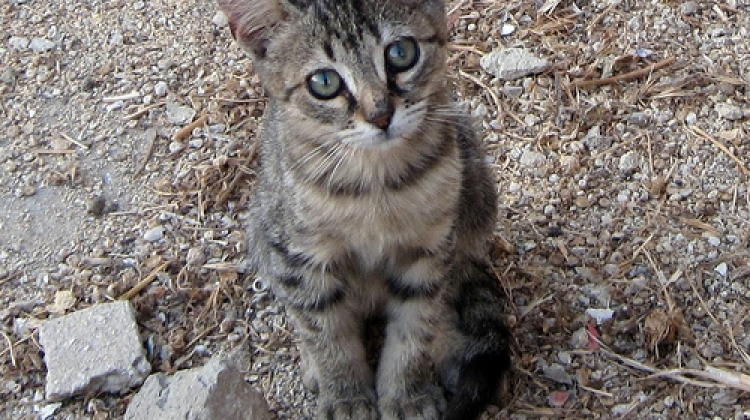Roberta
Sat 23 February 2019
0
It is a comonly held belief that cats are independent, self-reliant creatures, very little attached to their cohabiting human, and therefore, creatures that suffer less from removal from home. This couldn't be further from the truth! We are used to often think about the issue of abandonment of dogs, especially as the summer holidays approach. This is indeed a huge problem that involves many associations, volunteers, veterinarians and ordinary people and their great effort to stem this phenomenon and to save the lives of many dogs in risk of abandonment. Yet, we never hear of cat abandonment: why is that?
Dozens of adult cats are abandoned every year. They are left on the street, in the woods, in cat shelters, or amongst pre-existing feline colonies, etc., while the humans abandoning them are convinced that the cats will be able to survive perfectly “in the wild” without anyone's help. Some people go as far as thinking that they are doing the cat a favour "freeing him in nature"!
Let's clarify some key points:
- Cats have feelings: mr. Kitty is very fond of his humans, his home and his habits. He suffers enormously when he is separated from his family or romevoed from his home, to the point that many cats fall into a depressive state and let themselves starve or develop stress-induced behaviours (such as grooming obsessively, endlessly roaming, stopping to take care of their hygiene, etc.). Each cat has his unique and exclusive sensitivity and will suffer from the damaging effects of abandonment.
- A house cat is not a wild hunter: a cat used to eating dry or wet food every day (as we assume a cat was used to while living in the family until the time of abandonment) will have great difficulty finding the right amount of food while feeling lost in a place he does not know. He will not know what resources are available to him, he will not have enough experience to be able to find them and obtain them in the best way; he will most likely clash with other local predators (cats, dogs, foxes, etc.) and he will not be able to find sources of water to have it available every day. All this will quickly cause the cat to lose strength, which in turn will decrease his capability of huting for survival.
- There are countless dangers: mr. Kitty will be exposed to all kinds of dangers, even deadly ones: cars, violent humans, aggressive animals, poison, parasitic and viral infections transmitted by other animals, and many more from which he cannot defend himself. He will also have no way of taking care of himself in case of an accident or illness, and he will, thus, be condemned to die of a quick and violent death at best, or, at worst, a slow and painful one.
- Abandonment in a boarding cattery is not any better: in case mr. Kitty is abandoned in a boarding cattery, it does not necessarily mean things will be alright. Here are some situations which can occur: he will live a great amount of stress due to the forced cohabitation with other cats; there will surely be some sick cats so the risk of infection will be very high; he will be a victim of "bullying" by other cats of the artificial colony; and lastly, he may have difficulty accessing food or litters (which in any cattery, among other things, are always a source of parasitic infection risk. This is so despite the enormous and meticulous work of volunteers, which, unfortunately are never enough, just as the economic resources and materials to guarantee perfect environmental conditions).
- Emotional suffering: YOUR CAT LOVES YOU! No matter how much you are attached to him, how much attention you give him or how much you pet and cuddle him, he will always have a strong emotional bond towards you. Finding himself abandoned, suddenly and for no reason, in an unknown place far from his beloved and trusted human will be a shock that will traumatize him for the rest of his life!
Let's now look at some commonly held beliefs of humans set on getting rid of their cat:
- "He has been sterilised, he will not be attacked by other cats!"
Sterilised cats get attacked much more frequently by stray cats because they are not considered competitive in fighting, so they get attacked and removed in order to safeguard the territory's resources. - "I'm leaving him in a cattery, so they will immediately find him another family!"
Catteries are always full and most (more than 80%) of the cats will remain in there for life (which, moreover, will be much shorter than expected due to the highly stressful situation and possible spread of diseases). People generally adopt kittens; very few adult cats are adopted, especially if the cat in question should have some understandable behavioral problem due to the shock suffered from abandonment. Moreover, even if a cat were to stay in a shelter only a few days, he could still suffer from permanent physical and psychological traumas. - "The situation at home is unbearable (for this and that reason), so somewhere else will be much better than here!"
No, for the cat it will be much better at home where he has always lived, and whatever the home problem is, there are experts (cat experts or veterinarians) that will be able to find a solution. If there really is no solution at home, then the experts will help find a new suitable family and organize the house change for mr. Kitty, as painlessly as possible, assisting him, you and the new adopting family. - "My life cannot be conditioned by the cat, every time I want to travel I have to turn down the idea because I cannot leave the cat alone!"
This is one of the most frequent reasons for abandonment, and one of the most stupid! First you can ask a trusted person to go once or twice a day to deal with mr. Kitty, if this is not possible you can contact a cat-sitter who for a little money will take care of him in your absence. If even this option is not feasible for you there are pensions where you can leave mr. Kitty for the necessary time (in this case, I recommend you make sure the chosen establishment is reliable: go and visit it first, check that the cats are not locked up in inadequate cages and that all the sanitary and safety regulations are followed). You could even leave it at a trusted person's house. But, if none of these options are available to you, then perhaps it is worth considering that you should not have adopted a cat in the first place. In this case, you can speak to an expert who will help you find a new family for your cat in the best way possible. - "Cats have nine lives, he'll be absolutely fine!"
Cats have one single life, just as we do: he will not be fine, he will be terrified, alone, panic-stricken and exposed to dangers of all sorts.
Abandonment is never a solution, nor is it an option to consider, it is only a gesture of cruelty and irresponsibility. If we chose to take on the task of sharing our life with another living being, regardless of the species to which it belongs, we must assure ourselves of its physical and emotional well-being: there are a thousand other things to do to solve a problem of coexistence before abandoning your cat!
FISAP CAB Roberta Roscini
ICAN Feline Behaviourist (Consultant)


Add new comment